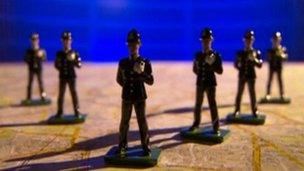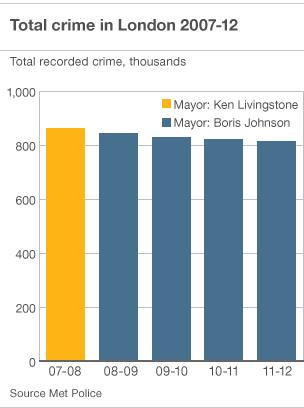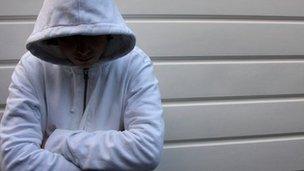London election 2012: Mayoral rivals pledge crime fight
- Published

The main candidates have all said they will either maintain or increase police numbers on the street
"London is one of the safest capitals in the world."
It is a claim that might surprise some of the city's residents, but one that has been made by the current and former London mayors, as well as Scotland Yard.
By comparing London's crime and murder rates with the likes of Washington DC, Bangkok and Guatemala City, the claim rings true.
London had the 21st lowest homicide rate out of 112 of the biggest cities surveyed by the United Nations in 2009 - that is 1.6 murders per 100,000 people.
Nevertheless, crime remains a concern for many Londoners and a key battleground in the mayoral election.
During Conservative candidate Boris Johnson's past four years as mayor, total crime has fallen - by about 4.6%, but at a slower rate than under his predecessor, Labour's Ken Livingstone.
The murder rate has dropped, with teenage deaths from gun and knife crime - a pivotal issue in the previous election - having almost halved since 2008.
But reported burglaries, robberies and sexual offences have risen in the past year.
Meanwhile, the number of police officers on the street has been a hot topic during the mayoral debates.
Tackling gangs
Mr Johnson says he has increased police numbers but Mr Livingstone says police numbers are down. So who is right?
Looking at Met figures during Mr Livingstone's first two terms, there was a huge recruitment drive, the biggest in the force's history, from about 25,000 to more than 31,000 officers.
In 2008, Mr Johnson was elected and police numbers continued to rise to more than 33,000 by the end of 2009.
But the number fell to 32,129 by the end of March this year - lower than the number of officers at their peak but 761 officers more than Mr Johnson inherited.
Looking forward, the main candidates are promising to either maintain or increase police numbers on the street.
But London School of Economics criminologist Dr Janet Foster says it is a myth that more officers leads to safer streets.
"It's far more important what police officers do and how they do it than how many of them there are," she said.
However, Mr Livingstone maintained: "If kids grow up knowing a copper can come round the corner at any time, they're less likely to get into trouble."
Mr Johnson said: "By detaching officers from other units, the commissioner believes we can have about 2,000 more police out there on front-line policing."
So how else do the candidates propose to make the capital safer?
Mr Johnson said work needed to be "intensified" to tackle domestic violence and rape.

Total crime in the capital has steadily fallen since Mr Johnson became mayor
He said he would "establish a new pan-London approach to the provision of independent domestic violence advisers".
"We can give women the confidence and help they need to bring the perpetrators to justice," he said.
He also said he would "step up the war on gangs" through Operation Trident, which deals with gun crime in the capital.
And he plans to "expand" his scheme for volunteers to mentor black boys thought to be at risk of becoming involved in crime.
"I want to make sure that the kids who are now 11 are not caught up in gangs but are given better alternatives by the time they are 15," he said.
Meanwhile, Mr Livingstone told BBC News: "I will appoint myself chairman of the mayor's office for policing and crime, and focus on rebuilding morale, getting police numbers up and turning things around."
To support young people at risk of getting involved in gangs, he said: "We've got to be working with neighbourhood groups and churches."
He said police practice on stop and search "needs to be targeted and a situation where only 6% are arrested and fewer charged is a complete waste of time".
'End kettling'
The Labour candidate said to improve the relationship between the police and the black community "we need to make sure police we recruit look like Londoners".
"About 10% of our force are black or Asian - we need to look towards 25%," he said.
The Green Party's Jenny Jones said that the Met's use of stop-and-search powers displays a "poor record" on civil liberties.
But there is an expectedly green hue to some of her other crime policies.

The main candidates have proposed different solutions to stop children getting involved in gangs
"Get more police officers out of their cars and on to foot or bicycle, providing a visible presence on the streets," she said.
She also promised to "improve enforcement of the rules of the road with safety cameras".
And she said she would push to "end the use of kettling tactics" to contain lawful protest.
Unsurprisingly, crime features prominently on policeman-turned-politician Brian Paddick's manifesto.
The Liberal Democrat candidate has pledged to give extra powers to communities and to tackle gangs by "providing positive alternatives".
"We're suggesting a £1-a-night tourist bed tax for London's four and five-star hotels," he told BBC News.
"It's done in many cities around the world and we reckon on the first year we could raise £10m which we would put directly into youth provision."
He also promised to end "racist stop and search" and to restore the relationship between the police and the black community, suggesting "there should be an inquiry into the black community's concerns into the lack of transparency around investigations into deaths in police custody".
Londoners go to the polls on Thursday 3 May.